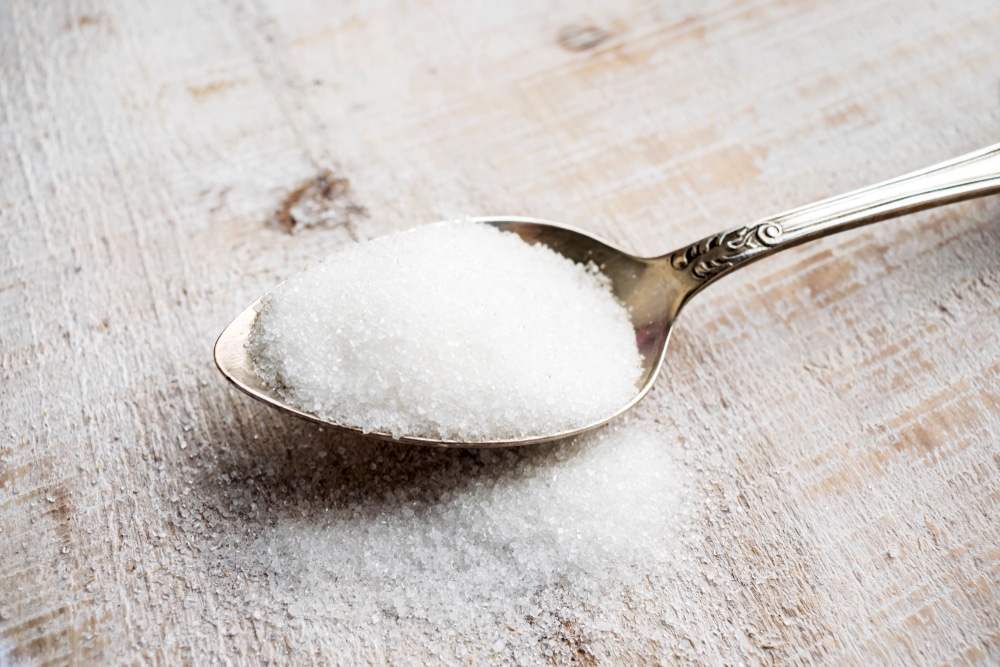Are you a new owner who just got their puppy and has bought all the possible treats in the world, but still considers sneaking it some of the sweet things we eat? Or are you one of those owners who simply cannot resist the big puppy eyes whenever you have candy and your dog feels like it is counting every bite you take? If you are, ask yourself, what do you know about artificial sweeteners, especially aspartame, and is it safe for dogs to have?
Aspartame, as an artificial sweetener, is relatively safe for your four-legged friend. However, we strongly recommend not giving this to your dog and instead finding dog-approved treats instead.
Table of Contents
What Are The Most Common Artificial Sweeteners?

You can find these food additives in different products. Manufacturers usually use them for the sweet taste, but without the calories sugar provides. Your dog may come in contact with these common sweeteners, so it’s important to be aware of what they are and can do (along with other products, such as Altoids, alcohol, and argan oil). We’ll start with aspartame.
Aspartame
This product is around 200 times sweeter than sugar, and manufacturers use it in small amounts as a sweetener. Even though is not dangerous to your pet, it could still cause mild gastrointestinal discomfort.
Stevia
This is a natural product harvesters extract from the plant stevia rebaudiana, and studies have shown it is safe for dogs. However, excessive amounts may lead to diarrhea.
Erythritol
Erythritol is sugar alcohol that is not caloric and safe for dogs, but it may cause tummy issues with your dog.
Monk Fruit Sweetener
As the name states, this sweetener comes from a plant, the fruit of which contains this sweetener. It is a choice of fruit for people seeking something sweet but without calories. Even though it is safe for dogs, it could cause gastrointestinal discomfort when given in larger amounts.
Sucralose
You can find sucralose in diet beverages or some baked foods. It’s not toxic for dogs. But just as with every other artificial sweetener, too much of it could make your dog sick.
Saccharine
Saccharine is found in salad dressings, diet drinks, and it is relatively safe for your pets.
Xylitol
Xylitol is a sweetener that could potentially cause major problems with your dog. It could cause excessive release of insulin in your dog’s body, which would cause your dog to go into a state of hypoglycemia, resulting in a coma. Xylitol also could damage the liver.
In short, xylitol should never be given to dogs.
What Is Aspartame And Should You Worry If Your Dogs Ingest Some?
Aspartame is low-calorie sweetener, and as mentioned above, it is around 200 times sweeter than sugar, meaning less of it is required to sweeten a product. It consists of two amino acids: phenylalanine and aspartic acid.
The good news is that aspartame is safe for dogs though. In general, your dog should not have any problem metabolizing aspartame as long as it has not digested a large amount (which depends on the dog, so we recommend owners just not allow their dog to have any aspartame).
If your dog did get his paws on your favorite treats, it may feel sick, it may throw up on your favorite carpet, or it may make even a stinkier mess. The dog is not to be blamed though. Aspartame is metabolized into methanol, which means large amounts could lead to brain damage, possibly blindness. However, studies have shown that in order for this to happen, your dog would probably need to ingest above 5,000 milligrams. As a comparison, sweetened yogurt contains around 130 milligrams of aspartame.
If this makes you uncertain or if you don’t know what your dog ate and how much it ate, please contact your vet, visit the emergency clinic, or contact animal poison control. It is not advisable to try and make your dog throw up at home.
So, What Is A Healthy Alternative For Your Dog?
Our recommendation would be fruit and vegetables, either raw or cooked. Nowadays, there are even cook books for your dog, with recipes far healthier than giving your pup something off the table that could potentially make it sick. Trust me, Google is your friend on this!
In Conclusion: Is Aspartame Safe For Dogs?
It’s okay to sometimes share some of the goodies you eat with your pet. But before giving any of them, please read the labels. As explained above, xylitol could potentially be deadly to your dog, unlike the other artificial sweeteners. Still, you won’t want to give even relatively safe sweeteners to your dog either. They may not be fatal in smaller doses, but they can still cause gastrointestinal issues.
Let us know in the comments below what fun recipes you find that are safe and sweet for dogs!
